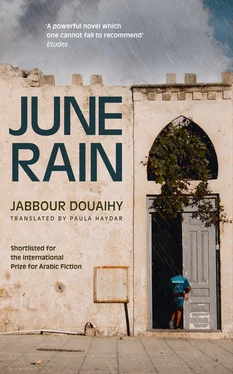‘It’s the mafia. They have magnets under the table to make the metal ball land wherever they want. It’s just not written for me to be comfortable…’
What he meant by ‘comfortable’ was being able to accumulate enough money to settle down. In Caracas, Venezuela, at the dog races, the same fate fell upon the animal he’d bet on. The dog had led for the whole race, way ahead of the pack, and then suddenly stopped. When he reached the final stretch, for some reason no one could understand, he stopped and looked behind, as if he were missing his friends and didn’t want to be so far away from them. He lowered his head and rubbed it in the sand while the other dogs sped past him and he ended up finishing last.
‘Who bets on a dog, anyway?’ he would ask himself. At the horse races in Beirut, he would lose on a photo finish.
‘I swear to God the jockey pulled the reins. I saw him with my own eyes.’
Then one day, because he accepted a friend’s invitation for a morning cup of coffee, he was late getting to the estate agent’s and missed the opportunity of a lifetime by fifteen minutes: a piece of land in the Al-Tall area of Tripoli that would have made him and his children’s children rich for generations. He never told of a single success in his entire life. He was just like a gambler who only tells you about his hard luck. Gambling was a losing game.
Nevertheless he lived like a prince, refined and well dressed, a wide gold chain around his neck and an expensive gold watch on his wrist. He went to the dentist regularly, took good care of his fingernails, and was one of the first to dye his hair for fear of inheriting a family tendency to turn grey early. He was terrified of his hair falling out and the possibility of going bald. He never rested from his escapades into God’s wide world. He filled the pages of three passports, which he saved and bound together. He showed them off to everyone, visa after visa, from Costa Rica to Equatorial Guinea. Sometimes he would return to his hometown vanquished, with broken wings, so bankrupt that if he pulled his pockets inside out not a single lira would fall out. He’d sleep at a relative’s who would grudgingly take him in.
But soon enough he would disappear, after catching wind of things he didn’t like to hear, such as ‘The atmosphere in town isn’t clean,’ or ‘God help us from those two days…’ He knew the stories about killing and vendettas would start up again, too. They had been weaned on killing, he said that about them with a certain amount of pity, and then set off again. He would strike up a new plan, head in a new direction, as if he could sniff out money from afar. The moment his friends came into some money, he found out about it. The news of who’d won at gambling or who’d been lucky in the wheat market or selling diamonds would come out, and he would show up at the winner’s door while the money was still fresh. He’d show up with all his stories and his jokes.
‘Did you smell it or something?’ they would ask him, laughing.
He never asked for money, but he always got it. He knew the Lebanese communities by heart, naturally preferring the rich people if they were still in their youth and the gamblers if they were old. He sought the generosity of rich young men looking for women and the foolishness of gamblers, but he spent almost his entire life taking from the rich in return for charm and ladies and giving to the gamblers in return for an obscure form of pleasure only they could give him: the pleasure of losing. Sometimes, though, he would get cut off in exile. He would run out of money all of a sudden after a wild night of uncontrolled drinking and dancing on tables in Santo Domingo or Havana with a brunette capable of seducing the devil. In Cuba, he had fruitlessly tried to pursue an old aunt who was said to have come to the island by mistake on her way to the United States, decided to stay and made a fortune from tobacco farming.
However, he was not lacking in wiliness. He would go to Lima airport, for example, ask for a telephone book and search under ‘K’ for all the ‘Kfourys’, confident that there were members of the Kfoury family in every corner of the world. He wouldn’t hesitate to call one of the numbers which stood out to him, and after a short conversation in which he explained that he’d been forced to leave his hometown suddenly because of the violent events taking place all around him and that some relatives of his had been murdered there in the Burj al-Hawa incident and now revenge killings were being carried out in every nook and cranny. He’d come to the Peruvian capital to escape and now he didn’t know what to do. In fact, he knew well what to do, for he captivated them with his story. But no sooner would he catch a whiff of the palm of his own hand than he would start yearning to play poker again. No one knows how he found his way to those Lebanese who could not be cured of the vice of gambling no matter how far they travelled. He competed with them at tequila drinking and bluffing opponents and forcing them to fold, until one night he got lucky and won all the money on the table. One of them who was from a town near Barqa became furious. After losing all the money he had in his pocket, he pulled out some Lebanese property deeds and asked for their value in cash. Upon inspection he discovered they were very large parcels, so he gave him what he figured was a good percentage of what they were worth. He put them away in his suitcase and nearly forgot all about them, until he was down on his luck again and went back to his hometown. The situation had calmed down and people had gone back about their business. He was penniless again, so he fished out his newly acquired deeds with the intention of selling them and using the money to set off again. He found a buyer willing to buy the deeds without carefully inspecting them, because he had offered them at a very low price. The buyer was afraid he might change his mind so he was quick to pay, requesting that he sign a bill of sale before the notary public to conclude the deal before the transfer of title to its new owner was listed on the real estate ledger. And once again, off he went into God’s wide world.
Muhsin chose the millstone, the one in the nearby olive press. One day, when the first barricades were being set up, all the neighbourhood boys worked together to push the massive stone out onto the street and set it up as a barricade for him. But Muhsin wouldn’t go near it until all the olive residue was cleaned off of it, that job having been delegated to others so the fighter, who should not have to stoop to such menial tasks, could concentrate on the weapons and the attack. Regardless, when Muhsin later sat behind it throughout the days of the revolution, from April to September of 1958, he wouldn’t stop picking at the little black specks of olive residue and removing them with his pocket knife with its seven blades and seven switches, which he never parted with. He plugged up the hole in the centre of the stone with three small sandbags, leaving one small peephole through which he slid the nose of his long barrel rifle and took aim at the opposing barricade. At first they had given him what they called a ‘Model’ rifle, but he hadn’t warmed to it.
‘It doesn’t scope well,’ he said, without bothering as one might expect to explain this new verb. We had never it heard before and had no idea where he had got it from. It was possible he coined the term when he fired the Model rifle, missed his target and decided to blame it on the rifle.
The day they acquired a long barrel rifle like the one he’d been asking for, they gave it to him and joked, ‘You don’t have any excuses anymore…’
Now his toolkit was complete and all that was left to do was show off his skill. In what resembled a rite of passage, he held the rifle in his hand, raised it vertically to examine its minute details, and fired it into the air before sitting on his chair and sliding the rifle into its peephole. He liked to lean over it at first, with his cheek pressed gently against the metal. He’d shut his left eye and look through the rear sight at the opposing side. At first we thought it was just a practice exercise, a fighter getting a feel for his gun. But he persisted in this training of his, spending long hours and intervals in some obscure operation which bored us to death because it never led to any action. He kept at it while we wondered why on earth Muhsin would aim and aim and never shoot. All we saw was that at the end of all the aiming, he shook his head menacingly, postponing his big deed to a later date, which might be very soon, apparently assuring himself that embracing his rifle for such a long time would not be in vain, even if it had left a pink dent in his right cheek that remained visible for some time.
Читать дальше












